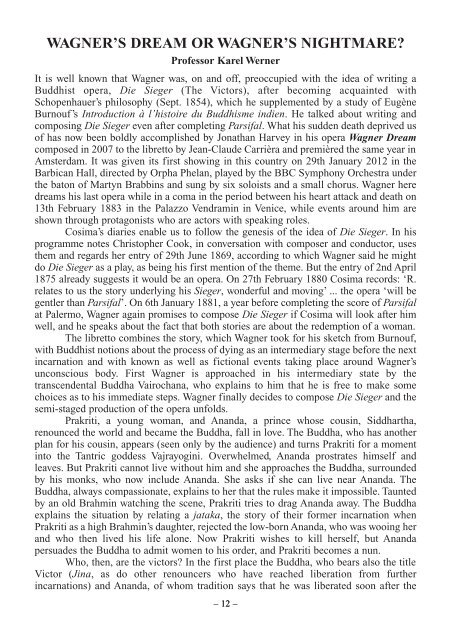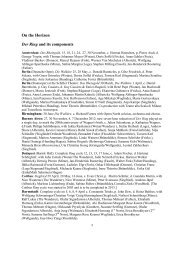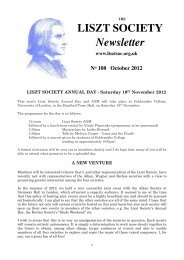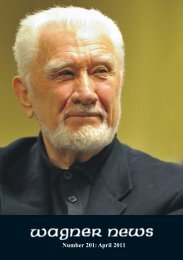13895 Wagner News 174 - Wagner Society of England
13895 Wagner News 174 - Wagner Society of England
13895 Wagner News 174 - Wagner Society of England
Create successful ePaper yourself
Turn your PDF publications into a flip-book with our unique Google optimized e-Paper software.
WAGNER’S DREAM OR WAGNER’S NIGHTMARE?<br />
Pr<strong>of</strong>essor Karel Werner<br />
It is well known that <strong>Wagner</strong> was, on and <strong>of</strong>f, preoccupied with the idea <strong>of</strong> writing a<br />
Buddhist opera, Die Sieger (The Victors), after becoming acquainted with<br />
Schopenhauer’s philosophy (Sept. 1854), which he supplemented by a study <strong>of</strong> Eugène<br />
Burnouf’s Introduction à l’histoire du Buddhisme indien. He talked about writing and<br />
composing Die Sieger even after completing Parsifal. What his sudden death deprived us<br />
<strong>of</strong> has now been boldly accomplished by Jonathan Harvey in his opera <strong>Wagner</strong> Dream<br />
composed in 2007 to the libretto by Jean-Claude Carrièra and premièred the same year in<br />
Amsterdam. It was given its first showing in this country on 29th January 2012 in the<br />
Barbican Hall, directed by Orpha Phelan, played by the BBC Symphony Orchestra under<br />
the baton <strong>of</strong> Martyn Brabbins and sung by six soloists and a small chorus. <strong>Wagner</strong> here<br />
dreams his last opera while in a coma in the period between his heart attack and death on<br />
13th February 1883 in the Palazzo Vendramin in Venice, while events around him are<br />
shown through protagonists who are actors with speaking roles.<br />
Cosima’s diaries enable us to follow the genesis <strong>of</strong> the idea <strong>of</strong> Die Sieger. In his<br />
programme notes Christopher Cook, in conversation with composer and conductor, uses<br />
them and regards her entry <strong>of</strong> 29th June 1869, according to which <strong>Wagner</strong> said he might<br />
do Die Sieger as a play, as being his first mention <strong>of</strong> the theme. But the entry <strong>of</strong> 2nd April<br />
1875 already suggests it would be an opera. On 27th February 1880 Cosima records: ‘R.<br />
relates to us the story underlying his Sieger, wonderful and moving’ ... the opera ‘will be<br />
gentler than Parsifal’. On 6th January 1881, a year before completing the score <strong>of</strong> Parsifal<br />
at Palermo, <strong>Wagner</strong> again promises to compose Die Sieger if Cosima will look after him<br />
well, and he speaks about the fact that both stories are about the redemption <strong>of</strong> a woman.<br />
The libretto combines the story, which <strong>Wagner</strong> took for his sketch from Burnouf,<br />
with Buddhist notions about the process <strong>of</strong> dying as an intermediary stage before the next<br />
incarnation and with known as well as fictional events taking place around <strong>Wagner</strong>’s<br />
unconscious body. First <strong>Wagner</strong> is approached in his intermediary state by the<br />
transcendental Buddha Vairochana, who explains to him that he is free to make some<br />
choices as to his immediate steps. <strong>Wagner</strong> finally decides to compose Die Sieger and the<br />
semi-staged production <strong>of</strong> the opera unfolds.<br />
Prakriti, a young woman, and Ananda, a prince whose cousin, Siddhartha,<br />
renounced the world and became the Buddha, fall in love. The Buddha, who has another<br />
plan for his cousin, appears (seen only by the audience) and turns Prakriti for a moment<br />
into the Tantric goddess Vajrayogini. Overwhelmed, Ananda prostrates himself and<br />
leaves. But Prakriti cannot live without him and she approaches the Buddha, surrounded<br />
by his monks, who now include Ananda. She asks if she can live near Ananda. The<br />
Buddha, always compassionate, explains to her that the rules make it impossible. Taunted<br />
by an old Brahmin watching the scene, Prakriti tries to drag Ananda away. The Buddha<br />
explains the situation by relating a jataka, the story <strong>of</strong> their former incarnation when<br />
Prakriti as a high Brahmin’s daughter, rejected the low-born Ananda, who was wooing her<br />
and who then lived his life alone. Now Prakriti wishes to kill herself, but Ananda<br />
persuades the Buddha to admit women to his order, and Prakriti becomes a nun.<br />
Who, then, are the victors? In the first place the Buddha, who bears also the title<br />
Victor (Jina, as do other renouncers who have reached liberation from further<br />
incarnations) and Ananda, <strong>of</strong> whom tradition says that he was liberated soon after the<br />
– 12 –










